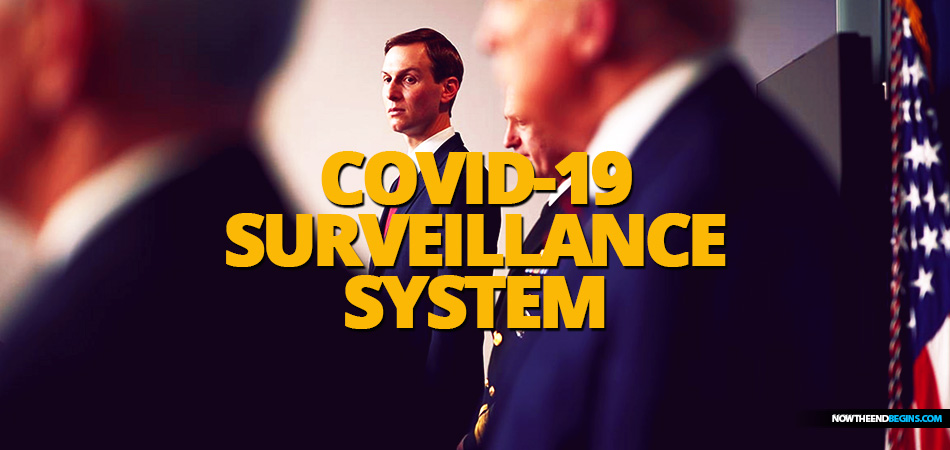
White House senior adviser Jared Kushner’s task force has reached out to a range of health technology companies about creating a national coronavirus surveillance system to give the government a near real-time view of where patients are seeking treatment and for what, and whether hospitals can accommodate them.
Isn't it amazing how fast everyone was locked down, and how easy it was to crash our robust economy seemingly overnight? Looks like 'they' didn't even work up a sweat doing it. And that $2 trillion dollar stimulus, wouldn't you like to know exactly in which account that was sitting? Me, too. So I suppose it is only fitting, given everything that has transpired over the last three weeks, that we are now talking about Jared Kushner and a national coronavirus surveillance tracking system. Yep, right on cue.
"After this I looked, and, behold, a door was opened in heaven: and the first voice which I heard was as it were of a trumpet talking with me; which said, Come up hither, and I will shew thee things which must be hereafter. And immediately I was in the spirit: and, behold, a throne was set in heaven, and one sat on the throne." Revelation 4:1,2 (KJB)
I believe with all my heart that Donald Trump is trying to do the right thing, I really do. But man oh man, does he have some Central Casting end times villians surrounding him. His "prayer team" is made up mostly of off-the-deep-end
Prosperity Gospel Charismatics like
Paula White, so that is only inviting in demons. I have heard through back channels that there is one, real bible believer in the inner circle, and I have been attempting to make contact with that person.
Even so, come Lord Jesus, we are ready to fly!
Jared Kushner And His Coronavirus Task Force Team Seeks National COVID-19 Surveillance System
FROM POLITICO: The proposed national network could help determine which areas of the country can safely relax social-distancing rules and which should remain vigilant. But it would also represent a significant expansion of government use of individual patient data, forcing a new reckoning over privacy limits amid a national crisis.
Health privacy laws already grant broad exceptions for national security purposes. But the prospect of compiling a national database of potentially sensitive health information has prompted concerns about its impact on civil liberties well after the coronavirus threat recedes, with some critics comparing it to the Patriot Act enacted after the 9/11 attacks.
 HYSTERICAL GLOBAL REACTION BY WORLD GOVERNMENTS TO CORONAVIRUS PANDEMIC LOOKS EXACTLY LIKE WHAT CONSPIRACY THEORISTS HAVE PREDICTED FOR YEARS NOW
HYSTERICAL GLOBAL REACTION BY WORLD GOVERNMENTS TO CORONAVIRUS PANDEMIC LOOKS EXACTLY LIKE WHAT CONSPIRACY THEORISTS HAVE PREDICTED FOR YEARS NOW
Already, the Trump administration has sought to ease data-sharing rules and assure health data companies they won’t be penalized for sharing information with state and federal officials — a move driven in part by Kushner’s push to assemble the national network, according to an individual with knowledge of the decision.
“This is a genuine crisis — we have to work through it and do our best to protect people’s health,” said Jessica Rich, a former director of the Federal Trade Commission’s consumer protection bureau. “But doing that doesn’t mean we have to destroy privacy.”
Currently, the federal government plays only a limited role in handling health information, with its access restricted by various privacy laws and in many cases reliant on voluntary data-sharing agreements with individual states.
The project — based on interviews with seven tech executives, government officials and other people familiar with its contours — would draw on detailed information collected from multiple private-sector databases. It would allow federal officials to continuously track elements like hospitals’ bed availability and the flow of patients into specific emergency rooms across the country — thereby enabling the government to rush resources to parts of the country before they’re hit by a surge of coronavirus cases.
“It allows you to be much more targeted and precise in how you engage,” said one person involved in the discussions. “They need data to make the policy decisions, and so that’s what we and others now have been asked to do.”
The White House declined to comment in response to detailed inquiries on Tuesday, but spokesman Avi Berkowitz said in a late Tuesday night statement after this article was published: "This story makes no sense and is completely false. The White House gets many unsolicited random proposals on a variety of topics, but Jared has no knowledge of this proposal or the people mentioned in this article who may have submitted it."
The creation of a national coronavirus database could help the nation get out in front of the fast-spreading virus, which officials anticipate will strain the health care systems of nearly every major city over the next few months and threaten to recur in pockets of the nation for some time after that. Yet concerns about data sharing and patient privacy aren’t the only obstacles to the plan — which was described by people familiar with it as one of a series of out-of-the-box initiatives sought by Jared Kushner’s team. That team is composed of a range of federal officials, friends and leaders from the private sector seeking to promote innovative responses to the coronavirus crisis.
The notion of a national surveillance network has also faced resistance internally from some health officials, who argue that the federal government should only go as far as setting broad standards for disease and resource tracking and leave it to individual states to stand up their own surveillance networks, according to two individuals with knowledge of the discussions.
READ MORE
No comments:
Post a Comment